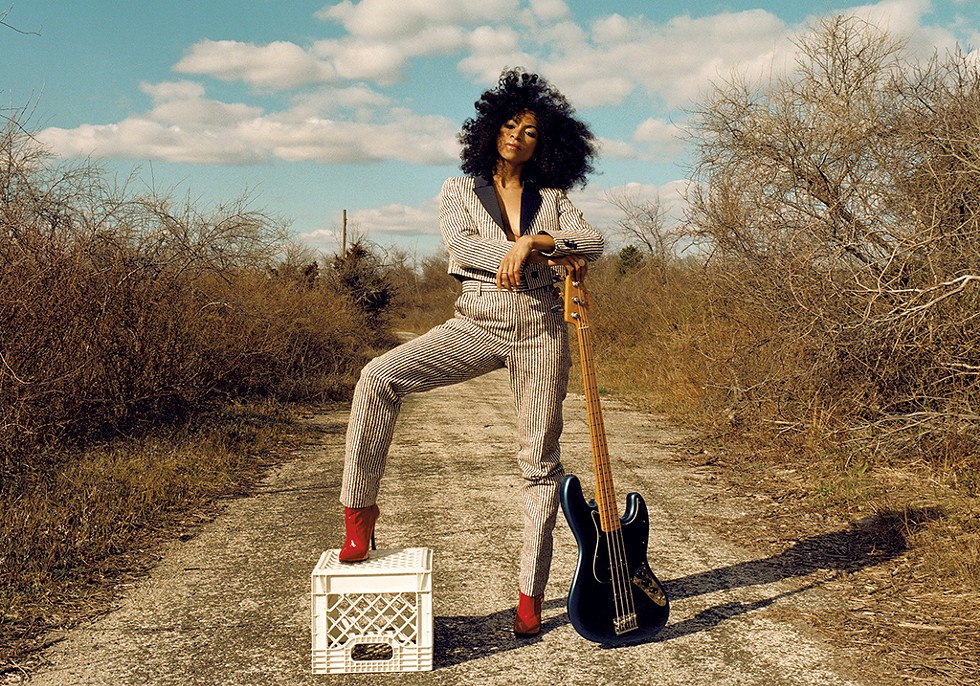
- Courtesy
- Adi Oasis
The 2024 Burlington Discover Jazz Festival lineup comprises a bold, genre-mashing collection of artists. Grammy-winning jazz stars Robert Glasper and Cécile McLorin Salvant top the marquee. They're joined by such outside-the-box selections as New Orleans bounce-music queen Big Freedia, Afrobeat star (and youngest son of Fela Kuti) Seun Kuti & Egypt 80, and Los Angeles-based blues poet Aja Monet.
Rounding out the festival are many others from near and far and of varying degrees of jazziness — including some who couldn't be called jazz under even the most generous definition. A Burlington tradition dating back four decades, the fest takes over downtown stages small and large, indoors and out, this Wednesday, June 5, through Sunday, June 9.
The bill is a statement of intent from both the Flynn, which presents the fest, and guest curator Adi Oasis. The Burlington nonprofit performing arts center and the Brooklyn-based French Caribbean musician are working together to transform the 41-year-old festival into a leaner, more modern affair.
But in certain corners of the local music scene, people are critical of the changes. They argue that on top of downsizing the festival, from 10 days of live music to five, the Flynn's programming includes less jazz overall — and offers fewer opportunities for locals to perform. They may have a point.
This is the third consecutive year the Flynn has employed a guest curator to plan the festival, which had been programmed by Flynn execs since its founding. In 2022, newly hired executive director Jay Wahl and then-artistic director Steve MacQueen brought in New York City-based bandleader Michael Mwenso to helm the festival. Last year, New York City saxophonist Lakecia Benjamin programmed a shortened five-day version, which, like this year's fest, was almost entirely free.
Before going solo in 2018, Oasis, this year's guest curator, played bass with an eclectic mix of artists: rocker Lenny Kravitz, rapper Anderson .Paak, and multi-hyphenate songwriter, performer and producer Thundercat. Oasis' own versatility and curiosity are reflected in her curatorial choices. First and foremost in her mind was putting together a jazz fest lineup that featured artists she felt deserved more recognition and representation — Black women, in particular.
"I have to give the Flynn credit — even though it's how it should be," Oasis said. "As opposed to having older men who might not necessarily even play an instrument book the artists, they brought in an immigrant, a Black woman and a mother."
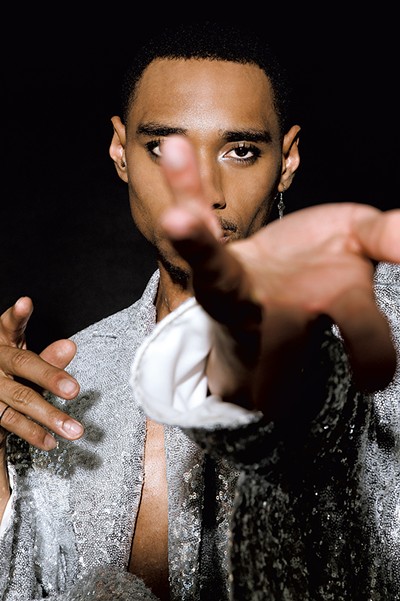
- Courtesy
- Durand Bernarr
When the festival first launched in 1984, one of its founding principles was providing a stage (lots of them, actually) for locals to shine. Sure, icons such as Ella Fitzgerald and Tito Puente brought star power — and crowds. But Vermont acts were the lifeblood of the festival.
"It was a very locally generated undertaking," said Tony Micocci, the Flynn's general manager from its founding in 1981 to 1985 and a pivotal player in launching the festival. One of the driving forces behind its creation might be familiar to Wahl and Oasis: disgruntled local jazz musicians.
In 1983, the Flynn was a nascent arts organization, far from the cultural monolith it would become. As the young nonprofit was finding its footing, Micocci was hounded by the city's hepcats, who wanted to know when the Flynn would spotlight jazz.
"I kept telling them to go to the clubs," he said, "because I didn't think drawing 200 people in a 1,400-seat theater would be comfortable for anyone."
Finally, Micocci relented and called a meeting of the city's jazz cognoscenti, club owners and arts leaders in the lobby of the Flynn to brainstorm ideas. The notion of a festival was born.
Micocci and Flynn executive director Andrea Rogers teamed up with Doreen Kraft from the Mayor's Arts Council, now Burlington City Arts, to produce the first Burlington Discover Jazz Festival the following June. Headliner Sarah Vaughan and the Modern Jazz Quartet topped the Flynn marquee, while local talent jazzed it up in small clubs, restaurants, parks and even city buses during the three-day event. As the festival grew, so did the opportunities for locals to play in it.
"The core [of the festival] was really a commitment to local musicians," said Micocci, now an arts management specialist in North Carolina. "They drove it."
Pre-pandemic, Vermont players got the spotlight in the "Around Town" programming, which includes venues other than the Flynn, Burlington waterfront and Church Street Marketplace. The number of free or low-cost local shows at bars, restaurants and cafés dwarfed the bigger-name offerings on the main stages.
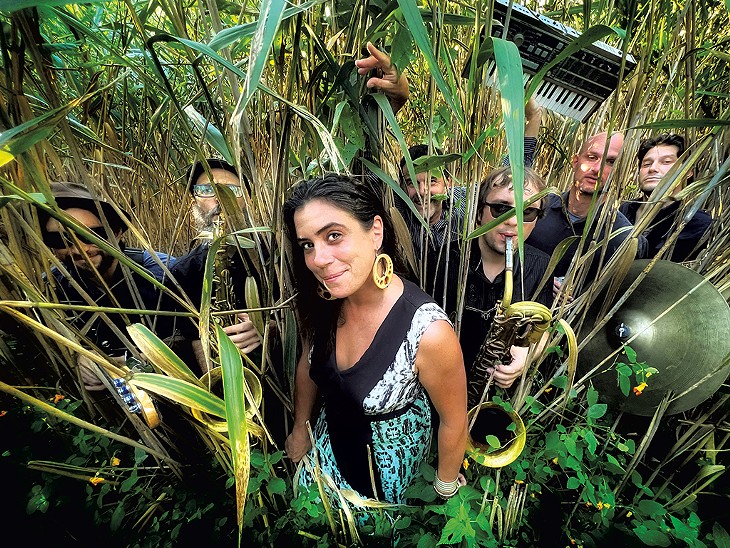
- Courtesy
- High Summer
This year, the printed festival guide includes a scant six "Around Town" venues hosting locals such as High Summer, Maple Street Six and Grippo Funk Band. A handful more shows are listed online, but that programming is a shadow of what it was in the festival's heyday. Most visibly, for the first time in decades, Leunig's Bistro & Café on the Church Street Marketplace will not host a tent featuring local jazz combos.
In a statement, Leunig's chef-owner Donnell Collins said she made the decision to scale back the restaurant's involvement "based on the major changes to the event that started last year and have continued this year." Leunig's hosted a tent last year but "found that the shortened program and new leadership of the event posed some challenges for us as a business and made us rethink our involvement," she wrote.
The Flynn doesn't program the "Around Town" slate; individual venues book their own shows for the fest. But to some, the loss of Leunig's is emblematic of deeper problems.
"For a lot of people, especially those who aren't big jazz fans, walking the marketplace and seeing jazz at the city hall stage and the Leunig's tent — places where jazz pours out of the windows — that's jazz fest to them," said Burlington guitarist Paul Asbell, who is playing two festival shows: Friday as part of the BCA Center's Twilight Series; and with Left Eye Jump at the tribute to late Burlington saxophonist Joe Moore at City Hall Park on Sunday.
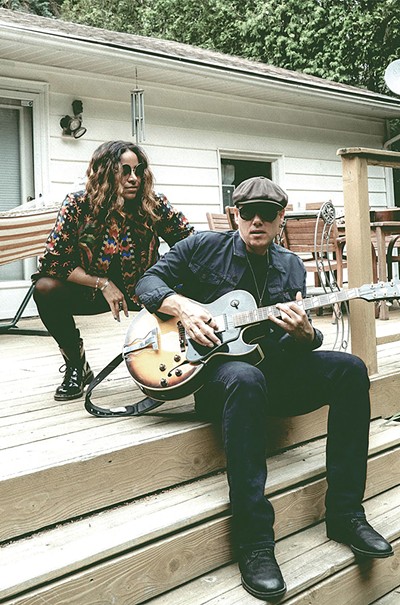
- Courtesy
- Dwight + Nicole
The Flynn Space black box theater, traditionally the go-to venue to see cutting-edge jazz musicians on the verge of breakouts, has largely sat empty during the past few festivals. It will again this year, with the exception of a $50-per-ticket opening-night fundraising soirée and a performance by the Illustrious Blacks on Friday as part of the Flynn's Hot Butter LGBTQIA+ Disco series.
"I think that's a huge mistake," Asbell said of the lack of Flynn Space programming. "That venue, physically and vibe-wise, is by the far the closest thing to what an actual jazz club is."
In a May 15 letter to the editor in Seven Days, Burlington jazz musician James Harvey ripped into Wahl, Oasis and the current state of the jazz fest.
"The lineup is completely devoid of jazz elders," Harvey wrote, citing past festival headliners Wayne Shorter, Herbie Hancock and Dizzy Gillespie — who, it's fair to note, are either dead or well into their eighties. Harvey also decried a lack of younger jazz icons on this year's bill beyond Salvant.
Wahl explained that the Flynn began employing guest curators "to explore different perspectives on where jazz is, where it's going, who's making it ... how it sounds, how it feels, how it makes you move," he said. "It gives us an opportunity to explore a different perspective."
On social media, grumbling about the lineup and length of the festival began as soon as it was announced. Some local jazz musicians are even planning to boycott.
Alex Stewart is a saxophonist and professor of jazz studies and ethnomusicology at the University of Vermont. He also produces Thursday jazz nights at the 126 nightclub in Burlington. He told Seven Days that he and others will not attend any Flynn-produced jazz fest shows this year due to their displeasure with the festival and, in particular, their feeling that the Flynn has shut them out.
"One of the things that's really set the Burlington jazz festival apart from a lot of other festivals was this really intimate connection between the local players and the world-class players," he said. In the past, he noted, local acts were often invited to open for headliners, and many of those big-name acts would turn up at locals-hosted jam sessions that were a festival staple. This year, there are fewer headliners — and fewer locals attached to those bills — than in previous years. Stewart also bemoaned the pre-pandemic dissolution of the festival advisory board, which gave locals the opportunity to weigh in on programming.
"It's just all being done without the local involvement it used to have," Stewart said of the festival. "And I think that's a real shame."
Dan Ryan, a local drummer, is also boycotting Flynn-programmed events during the fest due to what he sees as a disconnect between the nonprofit and the local scene. Ryan is playing a handful of non-Flynn gigs during this year's festival — down significantly from years past.
"For a lot of us, jazz fest is our most lucrative week of the year," said Ryan, who works two part-time jobs in addition to playing music professionally. Cutting the fest in half is a blow to those who count on it financially, he said.
"I'm all for bringing in musicians from wherever to play — it's how I've made a lot of friends," he said. "But not at the expense of cutting out the local scene. It just feels like we've been cast aside."
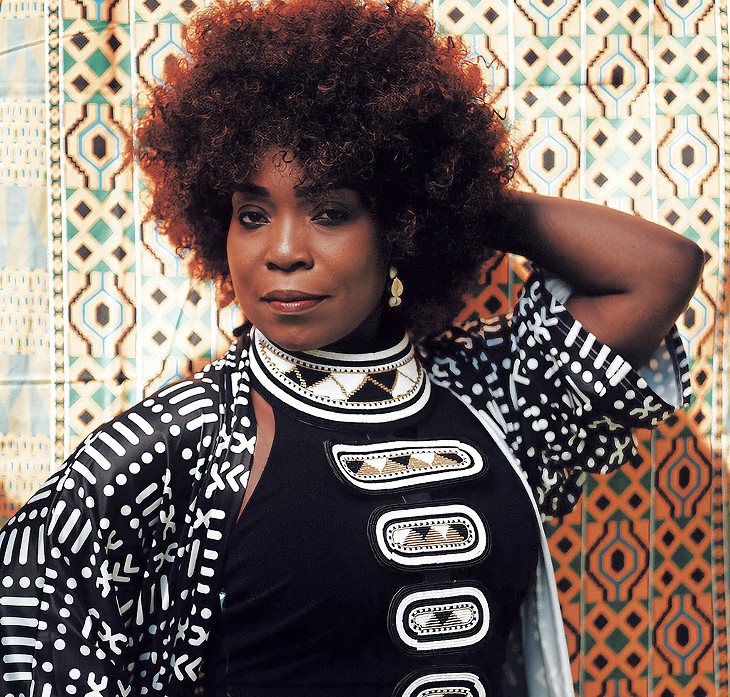
- Courtesy
- KeruBo
Responding to criticism that the festival has sidelined locals, Wahl highlighted the celebration of Moore on Sunday at City Hall Park, which features dozens of local musicians. He also noted local Afrobeat singer KeruBo playing the Top of the Block stage on Thursday; pop-fusion trio Acqua Mossa opening the Waterfront Park show headlined by Big Freedia, Oasis and Durand Bernarr on Friday; and the increased number of local school bands performing on the marketplace.
"We are very proud of local artists and will always continue to support them," he said.
Ray Vega isn't so sure about that.
"Jazz is community music; it's people music," he said. "And there is no connection with the jazz community — the people who listen to jazz and play jazz here 52 weeks a year — and the jazz fest."
The world-renowned trumpeter and jazz historian has headlined the jazz festival with Latin jazz icons Tito Puente and Poncho Sanchez. He's hosted a Wednesday jazz night at Hotel Vermont in Burlington that celebrates its 11th anniversary this week. He is also a senior lecturer in the jazz program at UVM and the host of "Friday Night Jazz" on Vermont Public.
While Vega is not among those boycotting the fest, he is skeptical of this year's lineup, noting, in particular, the lack of Latin jazz and acts that might appeal to more traditional fans. "It's 'jazz-light,'" he said.
Oasis' music lies somewhere at the intersection of funk and soul — her 2023 album Lotus Glow was dubbed "empowering, soul-soaked and seductive" by Atwood Magazine. But she chafes at narrow definitions of genre. To her, jazz is a constantly evolving medium that connects to other genres and vice versa, rather than a relic encased in amber.
"I'm not trying to get stuck on what jazz was," Oasis said. "Because it's constantly changing, which is part of its beauty. The way I look at it is: What has jazz influenced? Where is jazz going next? As soon as you look at that criteria, the options for what artists we wanted to bring got really exciting."
In choosing performers, Oasis sought out pedigree, but she was also dedicated to featuring plenty of new music.
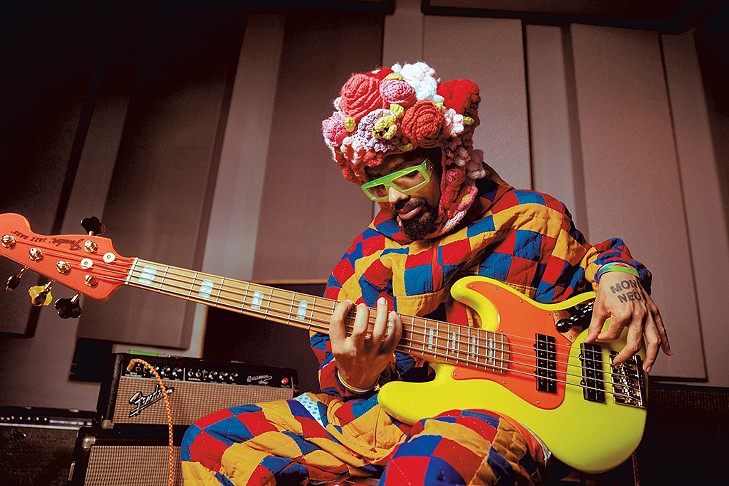
- Courtesy
- MonoNeon
"With a festival like this, you have to celebrate discovery," she continued. "Maybe getting a chance to see an artist like MonoNeon, who studied jazz but interprets it through another genre, wearing a bright orange ski suit while he's playing bass, will open a door for someone."
In that sense, Oasis has hewed to another of the festival's original visions, which was to introduce listeners to a wider spectrum of jazz music.
The mission of the festival was "to constantly look to expand an appreciation and understanding of what jazz is and build out its audience," Micocci said. "People 'discovering jazz' [had] to be baked into the DNA."
For Oasis, the thrill of highlighting new music goes hand in hand with the opportunity to bolster representation. The 39-year-old didn't start producing her own music until she was in her thirties, she said, because she hadn't seen other Black women doing it. While the notion of young attendees experiencing a broad, diverse bill excites her, for Oasis, it's merely a good start.
"Inclusion can't just be performative," she said. "You should want to live around people that are different from yourself, learn to see eye to eye and experience art together."
Oasis is particularly excited to finally see many of the acts she booked play live. Last year, she toured on a similar circuit with a number of this year's artists. But because she was pregnant, she often didn't stick around after her sets.
"As soon as I would finish playing, I'd go pass out," she said. "But now I can rectify that — I just had to bring them all to me!"
Touring while pregnant in 2023 also reinforced to Oasis just how important music festivals are to professional musicians. A festival gig is a sure paycheck, not to mention a chance for artists to socialize.
"In music today, there's a chain that has been broken," Oasis said. "Streaming has ripped away a huge portion of revenue for musicians, revenue that they would in turn use to finance their tours.
"We have to cherish events like [the jazz fest]," she went on. "Without festivals, a lot of artists like me wouldn't be able to make a living. And fans wouldn't get a chance to see a lot of the music we're bringing with us in June."
No doubt about that. But from the beginning, Burlington Discover Jazz Festival has also been a chance for fans to celebrate local musicians — and a chance for them to make a living, too. As the fest enters a new decade, those stewards tasked with guiding it into the future must also reconcile whether there are lessons to be learned from its past.
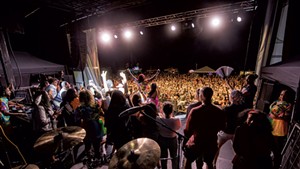
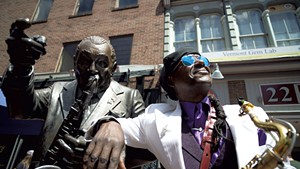
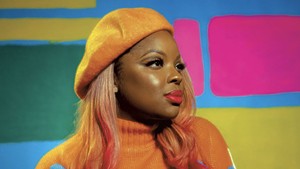









Comments
Comments are closed.
From 2014-2020, Seven Days allowed readers to comment on all stories posted on our website. While we've appreciated the suggestions and insights, right now Seven Days is prioritizing our core mission — producing high-quality, responsible local journalism — over moderating online debates between readers.
To criticize, correct or praise our reporting, please send us a letter to the editor or send us a tip. We’ll check it out and report the results.
Online comments may return when we have better tech tools for managing them. Thanks for reading.